Union Minister of State for Panchayati Raj Prof. S. P. Singh Baghel inaugurated National Workshop on the People’s Plan Campaign 2024 – Sabki Yojana Sabka Vikas at Dr. Ambedkar International Centre, New Delhi. The Ministry of Panchayati Raj organized a National Workshop on the People’s Plan Campaign 2024 – Sabki Yojana Sabka Vikas, which set the stage for the nationwide launch of the campaign on 2nd October 2024. A video message from Union Minister of Panchayati Raj Shri Rajiv Ranjan Singh alias Lalan Singh was screened at inaugural session, emphasizing the need for wholehearted support and active engagement from Panchayati Raj Institutions (PRIs) and stakeholders in the participatory process of Panchayat Development Plans, an annual initiative focused on the holistic development of Panchayats and the achievement of Sustainable Development Goals, embodying the true spirit of ‘Sabki Yojana, Sabka Vikas’.
Secretary, Ministry of Panchayati Raj, Shri Vivek Bharadwaj, Shri Shailesh Kumar Singh, Secretary, Ministry of Rural Development, Dr. Subodh Agarwal, Director General, Indira Gandhi Institute of Panchayati Raj and Rural Development, Government of Rajasthan, Shri Chandra Bhushan Kumar, Additional Secretary & Mission Director, Jal Jeevan Mission, Department of Drinking Water & Sanitation, Shri Narendra Bhooshan, Additional Chief Secretary, Department of Panchayati Raj, Government of Uttar Pradesh graced the occasion.
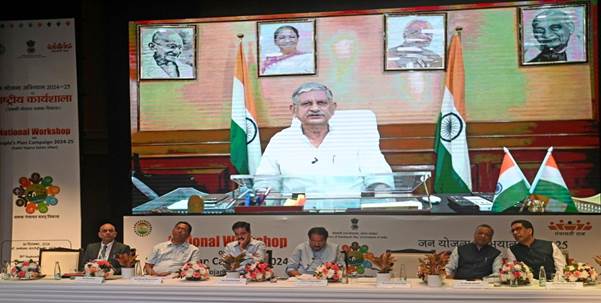
MoS Prof. S.P. Singh Baghel described the ‘Sabki Yojana, Sabka Vikas’ campaign as a plan by the people, for the people, and of the people. Prof. Baghel urged Panchayat representatives to formulate Gram Panchayat Development Plans with a holistic approach, keeping the entire village in mind. He mentioned that in the past decade, unprecedented work has been done in the field of rural development. Under the guidance of Prime Minister Shri Narendra Modi, there has been a significant increase in the grants provided by the Central Finance Commission and Panchayats should make proper use of these funds in their development plans.
Prof. Baghel stated the Ministry of Panchayati Raj has localized the Sustainable Development Goals (SDGs) by integrating them into nine key focus areas. If each panchayat systematically incorporates activities related to these nine areas into its Gram Panchayat Development Plan, it has potential to realize the vision and concept of Gram Swaraj. Prof. Baghel stated that empowered Panchayats will form the foundation of a developed India, and thus, we must focus on developing panchayats as capable, efficient and better service providers. Expressing concern over the declining groundwater levels in rural areas, he urged Panchayats to work towards water conservation. He also emphasized the importance of rainwater harvesting.
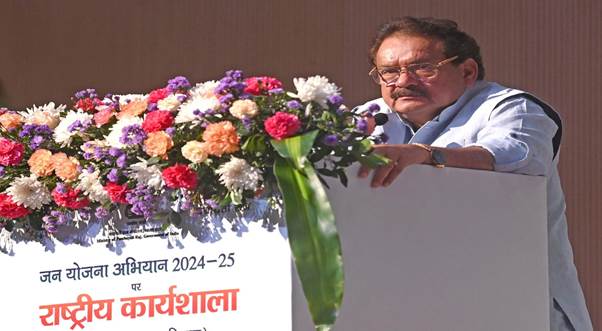
During the inaugural session, the Booklet on People’s Plan Campaign (2024–25) for Preparation of Panchayat Development Plans for Financial Year (2025–26), and the Annual Action Plan 2024–25 Report of Rashtriya Gram Swaraj Abhiyan (RGSA) were unveiled. MoS Prof. S. P. Singh Baghel launched the Hindi Website of the Ministry of Panchayati Raj, enhancing accessibility for Hindi-speaking users.
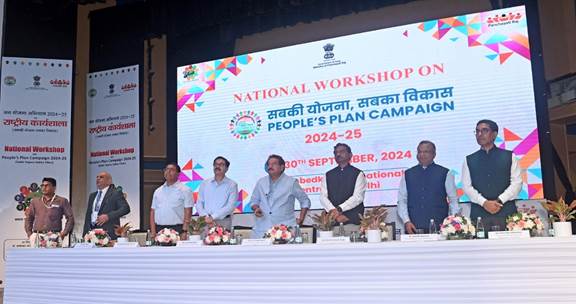
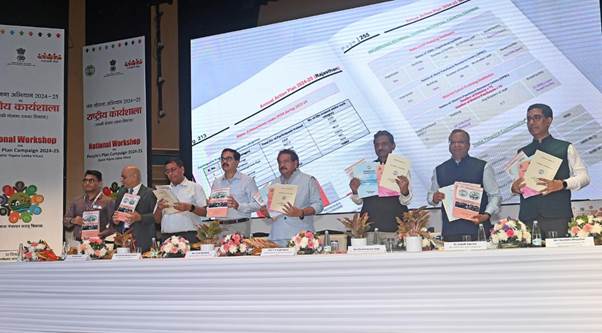
Shri Vivek Bharadwaj stated that the role of Panchayats in village development is like a force multiplier. All government schemes can be accelerated through the Panchayats. He mentioned that for the last 8 – 10 years, through the efforts of the Central Government, State Governments and Panchayats, the Gram Panchayat Development Plan (GPDP) is being prepared in a planned manner. The aim is to make rural areas self-reliant as well. Emphasizing the proper implementation of the Gram Panchayat Development Plan at the grassroots level, he also stressed the importance of greater participation in Gram Sabha meetings. He urged Panchayat officials to make the Gram Panchayat Development Plan more people-centric and participatory. He suggested that the proper use of resources, keeping in mind local needs, should be incorporated into the Gram Panchayat Development Plan.
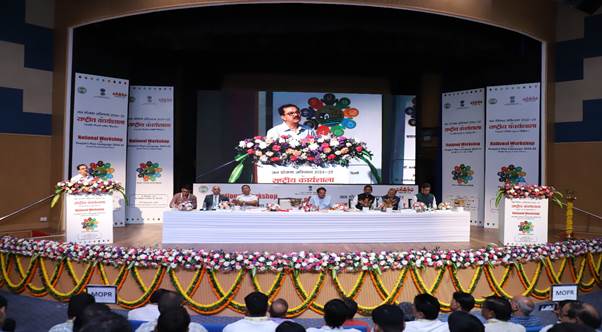
Shri Vivek Bharadwaj drew a connection between Mahatma Gandhi’s vision of Gram Swaraj and the current efforts to empower Gram Panchayats towards achieving self-reliance. He called for more focus on meaningful convergence and improving the effectiveness of the planning process. He appreciated the unprecedented collaboration between the Unnat Bharat Abhiyan (UBA), coordinated by IIT Delhi and the People’s Plan Campaign (PPC) 2024–25. This year, Unnat Bharat Abhiyan will play a pivotal role by involving over 20,000 students in the Sabki Yojana Sabka Vikas Abhiyan.
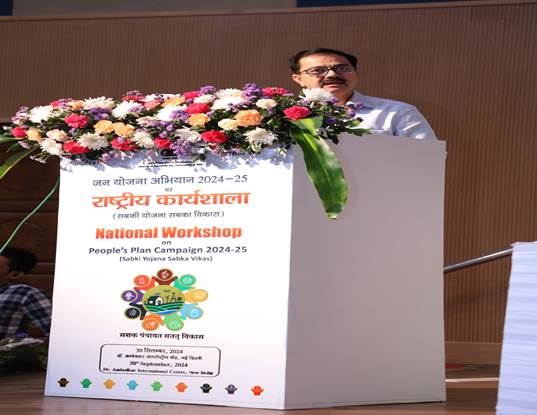
Shri Shailesh Kumar Singh emphasized a transformative shift in the approach to rural planning during the workshop. He highlighted the transition from the Village Poverty Reduction Plan (VPRP) to the Village Prosperity and Resilience Plan (VPRP), reflecting a positive change in perception. This shift represents a move towards a community demand-driven plan, which plays a crucial role in strengthening the Gram Panchayat Development Plan (GPDP). The VPRP is prepared by the Self Help Group (SHG) network and its federations, ensuring that local communities directly contribute to the planning process. The plan is formally presented during Gram Sabha meetings, which are held from October to December each year, fostering a bottom-up, participatory approach to development that is inclusive and resilient.
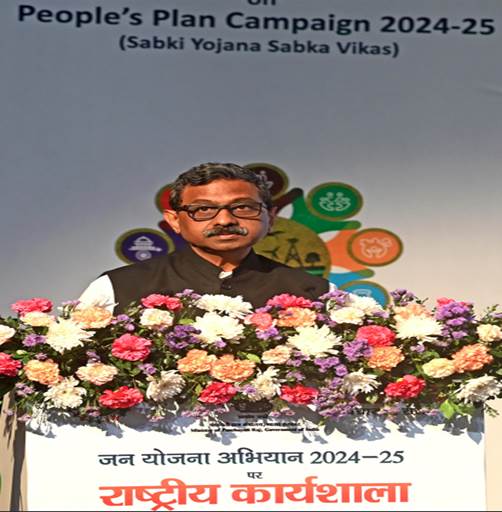
Shri Chandra Bhushan Kumar commended the People’s Plan Campaign (PPC) Workshop, calling it timely and well-aligned with the upcoming Swachh Bharat Diwas on Gandhi Jayanti and the ongoing Swachhata Hi Seva. He underlined the essential role of Panchayats in maintaining infrastructure related to Swachh Bharat Mission and Jal Jeevan Mission. He highlighted the remarkable progress in rural water supply, noting that in 2019, only 17% of rural households had access to piped water. By 2024, this figure has risen to 78%, with over 15 crore rural households now receiving piped water.
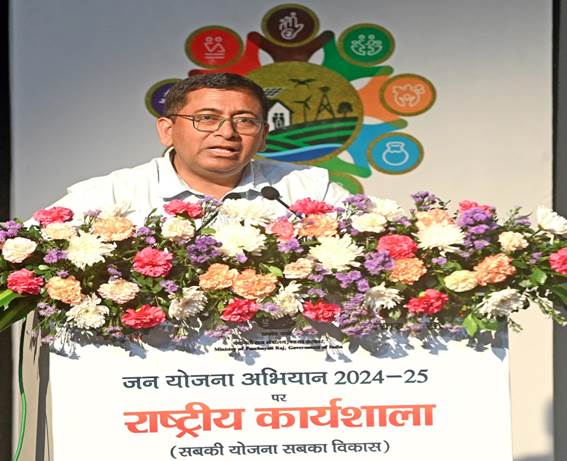
Shri Vikas Anand, Joint Secretary, Ministry of Panchayati Raj said that for the first time, village-wise planning provisions are being implemented in PESA Panchayats starting this year. Moreover, the Ministry is launching PPC Booklets in various languages to facilitate better understanding and implementation across diverse linguistic regions.
The workshop was broadcast live in eight regional languages – Gujarati, Bengali, Tamil, Telugu, Marathi, Malayalam, Kannada, and English – using AI-powered tools developed under Bhashini, showcasing an innovative and inclusive communication strategy.
The workshop saw participation from approximately 400 delegates, representing a diverse cross-section of stakeholders. Participants included officials from Union Ministries/ Departments, States/UTs, State Panchayati Raj Departments, National Institute of Rural Development & Panchayati Raj (NIRD&PR), State Institutes of Rural Development & Panchayati Raj, District and Block-level officials, and elected representatives of three tiers of Panchayati Raj Institutions. The primary focus of the workshop was to orient participants on strategies, approaches, and roadmaps for preparing and uploading Panchayat Development Plans.
A short film on AI/ML-based evidence-based planning was screened during the workshop. The integration of AI/ML technologies, particularly through SVAMITVA Scheme maps, is providing valuable insights into various rural infrastructure components, such as house types, road conditions, water bodies, and solar potential. MoPR has identified the rooftop solar potential of over 25,000 villages, which will help facilitate the installation of solar panels under the PM Surya Ghar Muft Bijli Yojana, promoting green energy in rural areas.
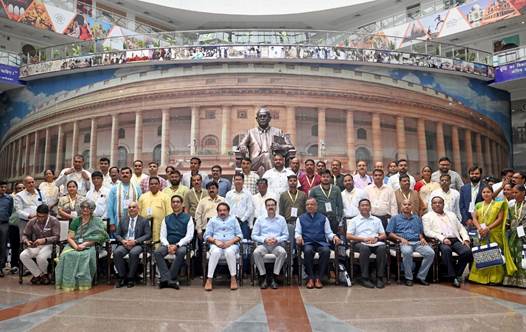
This workshop has set a robust foundation for the upcoming planning cycle under the People’s Plan Campaign 2024–25, reflecting the collective resolve for inclusive and evidence-based planning for the nation’s development at the Panchayat level. States/UTs in their Group Presentations outlined their experiences, strategies, problems, challenges and opportunities in preparation of quality GPDPs.
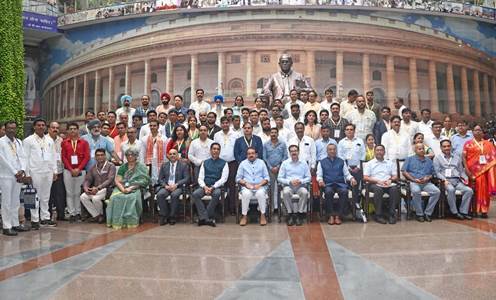
The workshop successfully laid the groundwork for the People’s Plan Campaign 2024-25, emphasizing participatory planning, convergence of resources, and the integration of advanced technologies in rural development. This year’s edition of People’s Plan Campaign will further strengthen the planning processes at the grassroots level, ensuring that the needs and aspirations of communities are addressed effectively.
 Matribhumi Samachar English
Matribhumi Samachar English


